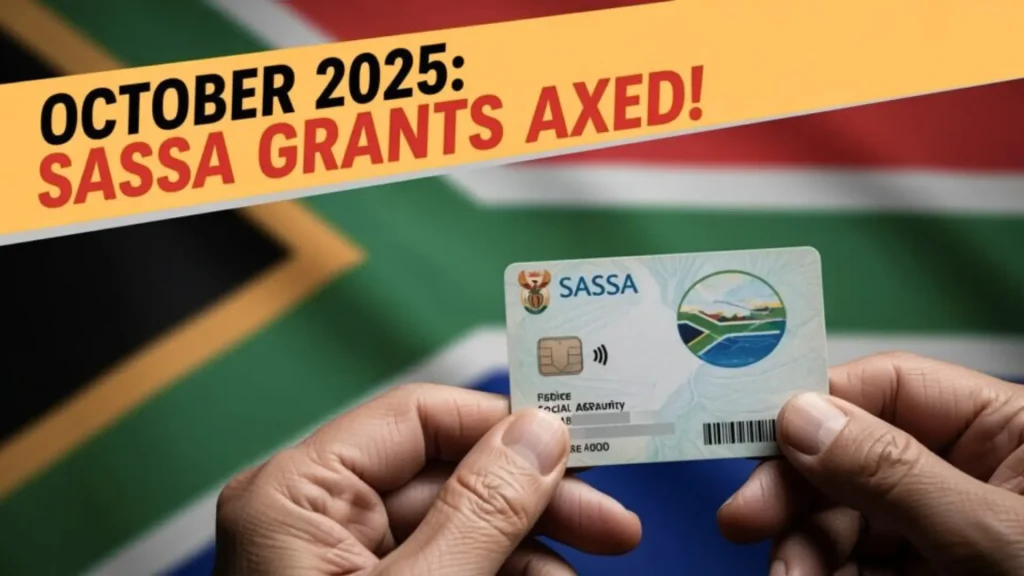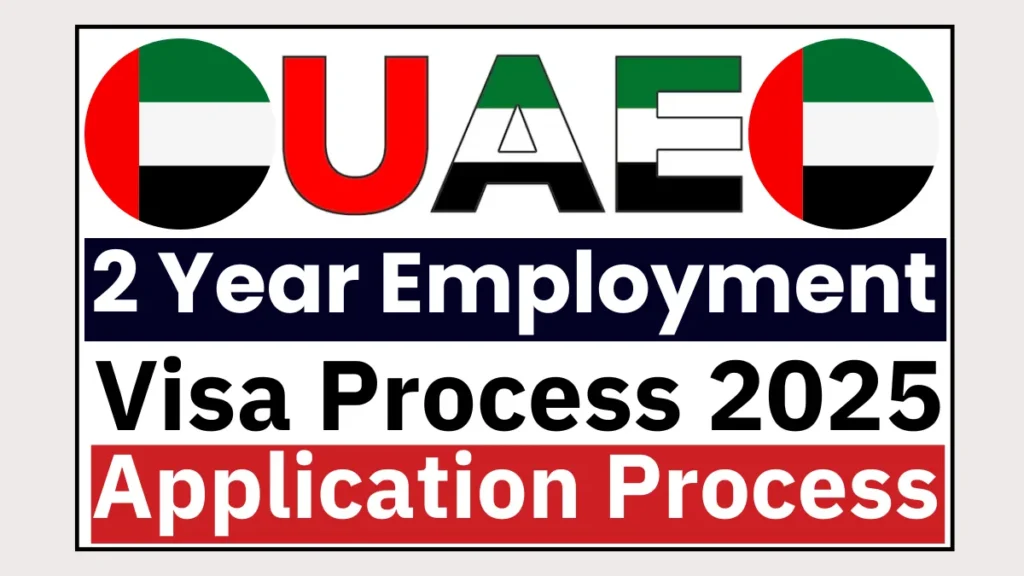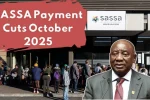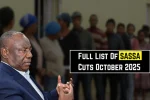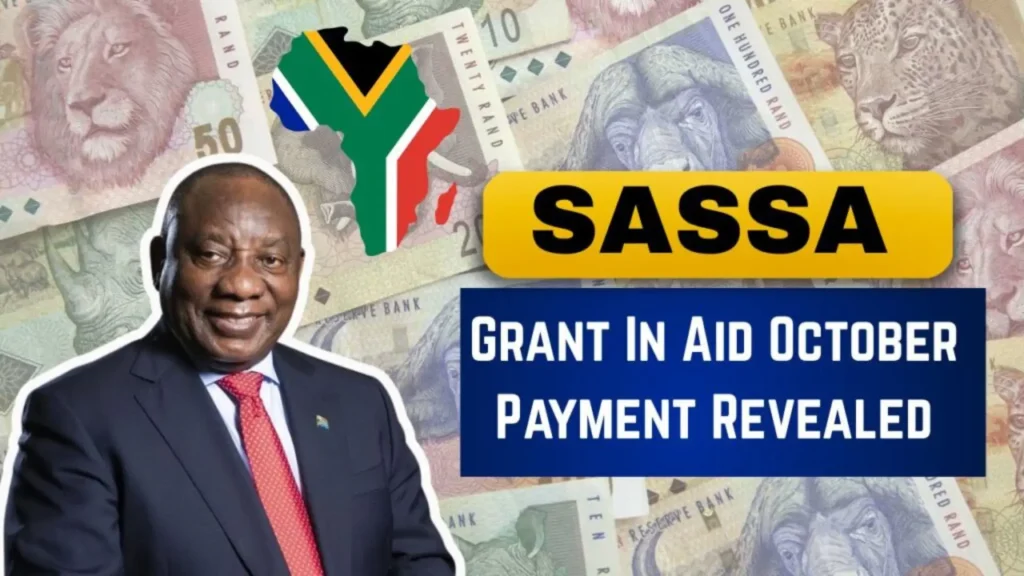If you receive social assistance in South Africa, it’s crucial to know about the upcoming October 2025 SASSA cuts. Several temporary grants will end after the deadline, affecting thousands of beneficiaries. This guide explains which grants will stop, why the changes are happening, and how to prepare.
What Grants Will Be Discontinued
The October 2025 SASSA cuts primarily affect temporary and emergency grants designed for short-term relief. These include:
- Social Relief of Distress (SRD) Grant: Originally introduced during the COVID-19 pandemic, this grant has been extended multiple times. It will finally be phased out completely by October 31, 2025.
- COVID-19 Top-up Payments: Any temporary pandemic-related additions to existing grants will also end on the same date.
- Temporary Disability Grant: Grants for disabilities expected to improve within a year will be restructured, with stricter qualification rules.
These changes are part of the government’s plan to move from emergency relief to sustainable long-term social security programs. The goal is to focus resources on those with permanent needs, such as the elderly, permanently disabled, and child support beneficiaries.
Why These Changes Are Happening
The SASSA grant cuts are due to several reasons:
- Budget Constraints: South Africa’s national budget faces pressure, requiring a review of social spending priorities.
- Shift from Emergency Support: The government is moving away from temporary pandemic-era assistance toward long-term programs.
- Reducing Dependency: By gradually removing temporary grants, beneficiaries are encouraged to seek employment or self-sufficiency where possible.
The Ministry of Social Development emphasizes that these changes are not abandoning social responsibility. Instead, they aim to strengthen permanent grant programs by redirecting resources from short-term grants to long-term solutions.
When You Need to Take Action
Beneficiaries affected by these changes should act early. The phase-out process begins about six months before the October 2025 deadline. Notifications will be sent to affected recipients.
- Verify Your Grant Status: Check through the SASSA website or visit your local office by April 2025 to confirm if your grant is affected.
- Apply for Permanent Grants: If you qualify for long-term support, submit applications as soon as possible, since processing may take time.
- Prepare for Changes: Start planning for alternatives, such as skills training or employment opportunities, to avoid financial disruption.
Grant Cut Dates
| Grant Type | Cut Date |
|---|---|
| Social Relief of Distress (SRD) | October 31, 2025 |
| COVID-19 Top-ups | October 31, 2025 |
| Temporary Disability | October 31, 2025* |
*Temporary Disability grants will also undergo stricter qualification checks during the cut.
How to Check If You’re Affected
To ensure you are not caught off guard:
- Identify Your Grant: Confirm the type of grant you currently receive using your approval documents or payment notifications.
- Contact SASSA: Call the toll-free helpline at 0800 60 10 11 or visit a nearby SASSA office with your ID and grant reference number.
- Use the Online Tools: SASSA’s website and mobile app have updated self-service tools to check grant status and get personalized information.
Avoid relying on rumors or unofficial sources; always verify directly with SASSA.
Real-Life Impact: The Mthembu Family
The Mthembu family from KwaZulu-Natal provides an example of how these cuts will affect everyday South Africans.
- Thandi Mthembu, 42, is a mother of three who has been receiving the Temporary Disability Grant after a workplace injury in 2023.
- She also benefits from the SRD grant supplement to cover basic expenses and her children’s school fees.
- With both grants ending in October 2025, Thandi has enrolled in government skills training programs to support her family after the grants stop.
Thandi’s story shows that early awareness and planning can help families transition smoothly from temporary grants to sustainable income sources.
Preparing for the October 2025 SASSA Cuts
Here are practical steps to prepare:
- Check Your Eligibility for Permanent Grants: If you qualify for grants like the old-age pension, child support, or permanent disability, apply early.
- Plan Your Budget: Review your finances and make adjustments to cover expenses after temporary grants end.
- Consider Employment or Training Programs: Government and NGO programs can help develop skills for income generation.
- Stay Informed: Regularly visit SASSA’s website and subscribe to notifications for updates on grants and deadlines.
By taking proactive steps, beneficiaries can avoid financial hardships when temporary grants are discontinued.
Conclusion
The October 2025 SASSA cuts will end several temporary grants, including SRD, COVID-19 top-ups, and certain Temporary Disability Grants. These changes are part of a broader plan to ensure sustainable, long-term social security support in South Africa. Beneficiaries should verify their grant status, apply for permanent support where applicable, and prepare for alternative income sources to avoid disruption. Acting early and staying informed will ensure a smoother transition and continued financial security.
FAQs About October 2025 SASSA cuts
Q1. Which SASSA grants will stop in October 2025?
The Social Relief of Distress (SRD) grant, COVID-19 top-ups, and Temporary Disability grants will end after October 31, 2025.
Q2. How can I check if my grant will be affected?
You can check your grant status online via SASSA’s website, use the mobile app, or visit a local SASSA office with your ID and grant reference number.
Q3. Can I apply for permanent grants after the temporary grants end?
Yes, if you meet the criteria, but it is recommended to apply early, as processing may take several weeks.
Q4. What should I do if I rely on a grant that will stop?
Start planning alternative income sources, such as employment, training programs, or applying for permanent grants.
Q5. Are these SASSA cuts permanent?
Yes, the affected temporary grants will not be renewed, but the government is strengthening long-term support programs for permanent beneficiaries.
